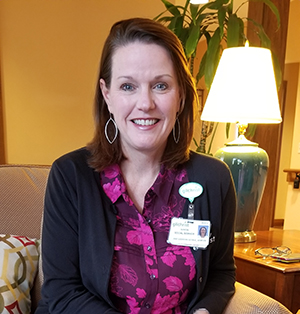The Life-changing Work of Social Workers
March is Social Work Month—the perfect time to highlight the critical role and life-changing work social workers play at Gilchrist for seriously ill patients and their families.
What Do Social Workers Do?
In their life-changing work, social workers visit with patients and families to counsel them through emotional challenges. They draw on their knowledge and training to empower families, engender hope and reduce distress. Above all, they listen with empathy and help people cope.
Because each patient and family face unique circumstances, every interaction is different. A patient may be experiencing depression, anxiety and regret. Or family members may have difficulty talking to each other about the impending death of a loved one and their resulting feelings.
A caregiver may need help finding resources in the community. Or advice to help them cope with stress. Sometimes, families just need someone to listen. A social worker can help with all of these issues.
Whatever it takes, social workers are there to help patients and family members maximize the quality of life for their remaining time together.
Social workers are critical members of every patient’s hospice team. They also help patients who receive Gilchrist’s Elder Medical Care at Home services. Social workers visit patients at their home or residential community center, and are available by phone in-between visits. Social workers are also available to patients and families at our inpatient hospice centers.
Perspective from a Gilchrist Social Worker

Amy LaMoure has been a social worker at Gilchrist’s inpatient hospice center in Towson for more than 23 years. Over the years, she has seen Gilchrist grow and develop into a critical resource for the community. The reason for this growth is Gilchrist’s reputation for excellence. When families in the community need hospice, they trust Gilchrist because a friend or a neighbor or a family member has experienced its care.
“Eventually, everyone will have someone they love needing end-of-life care,” says Amy. “When they need us, they know Gilchrist will be there.”
As a long-time social worker for Gilchrist, Amy often gets calls from people whose family members have previously been patients. Recently she recognized a patient whose family was using Gilchrist for the third time. Because they were familiar with Gilchrist, they knew their loved one would receive the same compassionate care they had come to rely on.
Families appreciate that there is no time limit to a visit—a social worker will spend as much time as a family needs with them. “If I spend all day with one patient or family because they need me, that’s what I do,” says Amy. “That’s one of the best things about us—we are here for those who need us when they need us.”
The work is sometimes difficult, Amy says. Sometimes she needs a few moments to herself after helping someone through a highly emotional situation. But she feels a great deal of joy and meaning in her work. She sees the role of a social worker as a guide for families during the dying process—helping people through their darkest times. When a family is facing the death of a loved one, few things could be more important.
To learn more about the care Gilchrist provides, visit gilchristcares.org.


